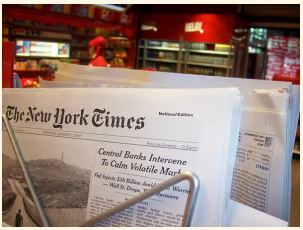7.2: Trailblazer
- Page ID
- 134163
Review Trailblazer: Michiko Kakutani

"Think about [reviewing] as a form of
reporting . . . with the addition of your . . .
carefully considered opinion."
Figure \(7.2\) Michiko Kakutani (https://openstax.org/ r/MichikoKakutani) is the former New York Times chief book critic. (credit: “New York Times” by mike/ flickr, CC BY 2.0)
Consistently Objective
Born in New Haven, Connecticut, Michiko Kakutani (b. 1955) is an American author and a literary critic. She graduated from Yale University in 1976 and began her career with The Washington Post as a reporter. She moved to Time magazine in 1977, then in 1979 began working for The New York Times, first as a reporter and then as a literary critic. She is probably best known for the position she held as chief book critic at The New York Times until her retirement in 2017. Highly respected—and often feared—as a critic, Kakutani won a Pulitzer Prize for criticism in 1998. Her book reviews for The New York Times were highly influential, with some reviews creating as much discussion and debate as the book being reviewed. American authors Jonathan Franzen (https://openstax.org/r/JonathanFranzen) (b. 1959) and Norman Mailer (https://openstax.org/r/ NormanMailer) (1923–2007), for instance, feuded publicly with Kakutani after she published negative reviews of their works.
Kakutani is also known as an author, having published two books since her retirement: The Death of Truth: Notes on Falsehood in the Age of Trump (2018) and Ex Libris: 100+ Books to Read and Reread (2020)—a collection of essays about books that have been influential and illuminating.
One reason for Kakutani’s effectiveness as a reviewer might be the air of mystery she maintained in the eyes of authors and publishers. Unafraid to say exactly what she thought about a literary work—and seemingly undaunted by the reactions of angry writers—she would praise an author for one book and pan the author’s next one. Shunning industry events, she curried neither access nor favor with authors and publishers and rarely gave interviews. Her refusal to get too close to authors and publishers added to her credibility and objectivity, possibly allowing her more freedom to review books honestly.
Instead of a simple thumbs-up or thumbs-down, Kakutani would make her evaluations clear in more subtle and comprehensive ways. For example, she referred to former director of the Federal Bureau of Investigation (FBI) James Comey (https://openstax.org/r/JamesComey)’s (b. 1960) book A Higher Loyalty: Truth, Lies, and Leadership (2018) as “absorbing” and the characters in Jamaican author Marlon James (https://openstax.org/r/ MarlonJames)’s (b. 1970) book Black Leopard, Red Wolf (2019) as “compelling.” Instead of a formula or template, Kakutani sought to read books as a reader, rather than a critic, would read and understand them. She tended to pick examples of what she liked and disliked and what she found notable about the book, without preconceived notions of what it “should” be. It might be fair to say that Kakutani’s evaluation criteria were never clear-cut; more often they were implied rather than explicit. However, decades of experience imbued Kakutani with historical knowledge and genre expertise that have provided the backbone of her reviews.
Discussion Questions
- How does Michiko Kakutani establish her credibility as a reviewer? In what ways does she demonstrate her knowledge of the subject she is reviewing?
- What evaluation criteria does Michiko Kakutani use to review a work?
- How does Michiko Kakutani avoid appearing biased? Do you think she is successful in her attempts?
- How would you respond to a writer who thought you reviewed their work unfairly?


